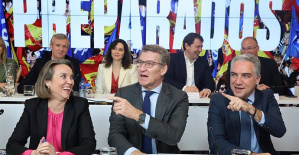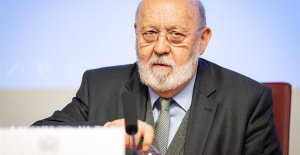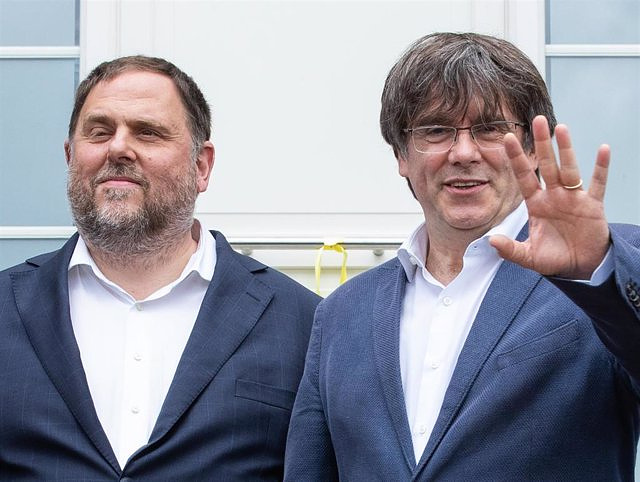This hypothetical law would benefit some 40 former senior Catalan officials prosecuted in the Court of Accounts
MADRID, 1 Oct. (EUROPA PRESS) -
The amnesty that ERC and Junts demand to enable the investiture of Pedro Sánchez as President of the Government could cover the accounting responsibility for the 'procés' of some 40 former Catalan senior officials prosecuted in the Court of Accounts (TCu) for the independence consultations of 9-N and 1-O, an amount that could exceed 10 million euros.
According to the legal sources consulted by Europa Press, the hypothetical amnesty law could cover not only criminal responsibilities, but also civil, administrative and accounting liabilities, which would also mean forgiving the facts analyzed in the TCu.
The experts questioned by Europa Press emphasize that, although 'a priori' amnesty laws are usually directed at criminal offenses, nothing prevents it from being extended to other infractions, stressing that everything will depend on how the legal norm is drafted, since it will be Its fine print determines which acts are forgiven and to what extent.
The organic law proposal launched in 2021 by ERC, Junts, PDeCat and the CUP set the starting point of the amnesty on January 1, 2013, when the process that led to the independence consultation of November 9, 2014 began.
In addition, it expressly said that the condoned conduct would be "all acts of political intention, whatever their result, classified as crimes or as administratively punishable conduct," including "sanctions issued or that may be issued by the Court of Accounts."
Along these lines, constitutionalists point out that the Amnesty Law of 1977 marks a precedent in this sense because it granted amnesty for violations of all kinds, from criminal ones to "administrative or governmental ones carried out with political intentions," and even "violations of a labor nature and union".
Located in this scenario, it would be necessary to distinguish between the accounting procedure for 9-N, already concluded with a final ruling, and that for 1-O, whose trial is scheduled to begin on November 17.
In 2018, the TCu sentenced former Catalan president Artur Mas and nine members of his former Government - Francesc Homs, Joana Ortega, Luis Beltrán, Josefina Valls, Irene Rigau, Jordi Vilajoana, Ignasi Genovés, Jaume Domingo and Teresa Prohías - to return to the Generalitat just over 4.9 million euros for the organization of the 9-N independence referendum. However, almost one million more is added to that figure for the interest accrued. In total, almost 6 million euros.
Although the TCu established that the 10 convicts had to face the payment jointly and severally, it also identified Mas as the main person responsible, determining that he would have to respond for all of them in the event that the others do not comply with the reimbursement. It was not until February 2022 when the supervisory body lifted the embargo on the assets of Mas and some former directors when it considered the amount plus his interest satisfied.
Legal sources consulted by this agency stated at the time that, although initially only 3 million were secured thanks to solidarity campaigns - which is why the homes had to be provided -, over the years and until July 2021, more monetary contributions were made until reaching more than 6 million euros.
The second procedure that could be affected in the TCu by a hypothetical amnesty is the one related to the diversion of public funds for the expenses of 1-O and the foreign action framed in the 'procés', where a total of 35 defendants appear -- among them the former president Carles Puigdemont; the one who was his 'number two', Oriol Junqueras; and his former advisors - from whom up to 5 million euros are being claimed, also jointly and severally.
The sentence with which the trial scheduled for November 17 will conclude will be determined by the accusations made by the Prosecutor's Office and the Catalan Civil Society (SCC), the only ones present in the case.
The Public Ministry's demand was initially directed against 35 former officials for 3.4 million euros, but it later excluded some - such as former councilors Joaquim Forn and Josep Rull - and also lowered its financial request to 3.1 million. of euros. For its part, SCC is targeting 11 former members of the Government from whom it demands 5 million euros.
Sources from the TCu clarify that in total there are 35 defendants who cannot be sentenced to an amount greater than the maximum of what is requested of them, that is, the 5 million collected in the Catalan Civil Society lawsuit. Until now, the supervisory body has set bonds worth 5.4 million euros that have been covered by the Catalan Institute of Finance (ICF), so at this point in the procedure that would be the only amount to be returned within the framework of a amnesty.
The sources emphasize that it will be necessary to follow the literal meaning of the amnesty law to determine to what extent the independence leaders can be freed from their accounting responsibilities.
Regarding 1-O, they remember that the TCu was directly commissioned by the Supreme Court (TS) to quantify the civil liability of the four convicted of embezzlement - Junqueras, Raül Romeva, Jordi Turull and Dolors Bassa -, therefore that, if the criminal part were amnestied, the civil part would also decline.
Thus, doubts are concentrated in the purely accounting procedures that derive from both 9-N and 1-O. It will be there, the experts emphasize, where the legislator will have to make legal filigree.

 Exploring Cardano: Inner Workings and Advantages of this Cryptocurrency
Exploring Cardano: Inner Workings and Advantages of this Cryptocurrency Seville.- Economy.- Innova.- STSA inaugurates its new painting and sealing hangar in San Pablo, for 18 million
Seville.- Economy.- Innova.- STSA inaugurates its new painting and sealing hangar in San Pablo, for 18 million Innova.- More than 300 volunteers join the Andalucía Compromiso Digital network in one month to facilitate access to ICT
Innova.- More than 300 volunteers join the Andalucía Compromiso Digital network in one month to facilitate access to ICT Innova.-AMP.- Ayesa acquires 51% of Sadiel, which will create new technological engineering products and expand markets
Innova.-AMP.- Ayesa acquires 51% of Sadiel, which will create new technological engineering products and expand markets The PP sees the concentration of support for Sánchez in Ferraz as a "failure" and believes that it "complicates" the story of its continuity
The PP sees the concentration of support for Sánchez in Ferraz as a "failure" and believes that it "complicates" the story of its continuity Marc Márquez returns to pole in Jerez
Marc Márquez returns to pole in Jerez The CIS carries out a quick survey on Sánchez's letter to measure the reaction of citizens
The CIS carries out a quick survey on Sánchez's letter to measure the reaction of citizens 12M.- Puigdemont to Sánchez and Illa: "This is not about the future of the PSOE! What have you believed?"
12M.- Puigdemont to Sánchez and Illa: "This is not about the future of the PSOE! What have you believed?" How Blockchain in being used to shape the future
How Blockchain in being used to shape the future Not just BTC and ETH: Here Are Some More Interesting Coins Worth Focusing on
Not just BTC and ETH: Here Are Some More Interesting Coins Worth Focusing on UPV students build a prototype of a wooden house to move to Equatorial Guinea
UPV students build a prototype of a wooden house to move to Equatorial Guinea The UA opens the call for the Impulso 2024 Awards for the best innovative business initiatives
The UA opens the call for the Impulso 2024 Awards for the best innovative business initiatives ALI, virtual assistant from Alicante, internationally recognized by the OECD
ALI, virtual assistant from Alicante, internationally recognized by the OECD Retrópolis brings the golden age of video games and computing to the UPV
Retrópolis brings the golden age of video games and computing to the UPV A million people demonstrate in France against Macron's pension reform
A million people demonstrate in France against Macron's pension reform Russia launches several missiles against "critical infrastructure" in the city of Zaporizhia
Russia launches several missiles against "critical infrastructure" in the city of Zaporizhia A "procession" remembers the dead of the Calabria shipwreck as bodies continue to wash up on the shore
A "procession" remembers the dead of the Calabria shipwreck as bodies continue to wash up on the shore Prison sentences handed down for three prominent Hong Kong pro-democracy activists
Prison sentences handed down for three prominent Hong Kong pro-democracy activists ETH continues to leave trading platforms, Ethereum balance on exchanges lowest in 3 years
ETH continues to leave trading platforms, Ethereum balance on exchanges lowest in 3 years Investors invest $450 million in Consensys, Ethereum incubator now valued at $7 billion
Investors invest $450 million in Consensys, Ethereum incubator now valued at $7 billion Alchemy Integrates Ethereum L2 Product Starknet to Enhance Web3 Scalability at a Price 100x Lower Than L1 Fees
Alchemy Integrates Ethereum L2 Product Starknet to Enhance Web3 Scalability at a Price 100x Lower Than L1 Fees Mining Report: Bitcoin's Electricity Consumption Declines by 25% in Q1 2022
Mining Report: Bitcoin's Electricity Consumption Declines by 25% in Q1 2022 Oil-to-Bitcoin Mining Firm Crusoe Energy Systems Raised $505 Million
Oil-to-Bitcoin Mining Firm Crusoe Energy Systems Raised $505 Million Microbt reveals the latest Bitcoin mining rigs -- Machines produce up to 126 TH/s with custom 5nm chip design
Microbt reveals the latest Bitcoin mining rigs -- Machines produce up to 126 TH/s with custom 5nm chip design Bitcoin's Mining Difficulty Hits a Lifetime High, With More Than 90% of BTC Supply Issued
Bitcoin's Mining Difficulty Hits a Lifetime High, With More Than 90% of BTC Supply Issued The Biggest Movers are Near, EOS, and RUNE during Friday's Selloff
The Biggest Movers are Near, EOS, and RUNE during Friday's Selloff Global Markets Spooked by a Hawkish Fed and Covid, Stocks and Crypto Gain After Musk Buys Twitter
Global Markets Spooked by a Hawkish Fed and Covid, Stocks and Crypto Gain After Musk Buys Twitter Bitso to offset carbon emissions from the Trading Platform's ERC20, ETH, and BTC Transactions
Bitso to offset carbon emissions from the Trading Platform's ERC20, ETH, and BTC Transactions Draftkings Announces 2022 College Hoops NFT Selection for March Madness
Draftkings Announces 2022 College Hoops NFT Selection for March Madness























